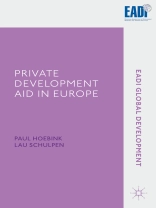The authors present an overview of private development aid in Belgium, Denmark, Finland, France, Ireland, Italy, the Netherlands, Spain, and the EU as a whole. They illustrate how private aid organisations receive support as well as the relations they have with their respective governments.
Inhaltsverzeichnis
1. Private Aid Agencies in the 21st Century: An Introduction; Paul Hoebink and Lau Schulpen 2. Mapping the Belgian NGDO Landscape in Relation to Development Cooperation: Dealing with Fragmentation and Emerging Complexities; Leen Nijs, Nadia Molenaers and Huib Huyse 3. Corporatism and the development of private aid organisations in Denmark; Lars Engberg Pedersen, Neil Webster and Torsten Geelan 4. Non-Governmental Development Organisations (NGDO) and Finland’s Development Policy; Lauri Siitonen 5. Irish Development NGOs and the Official Aid Programme of Ireland: A ‚Special‘ Relationship?; Eamonn Casey and Helen O’Neill 6. Condemned to Each Other – NGDO-Government Relations in the Netherlands; Lau Schulpen and Paul Hoebink 7. Spanish Development NGOs and the State: A Continuously Evolving Relationship; Christian Freres and Ignacio Martínez 8. Development Cooperation in New EU Member States: The Role of Non-Governmental Organisations; Maja Bucar, Anja Mesic and Eva Plibersek 9. From Flats and Mountains: Comparing European Private Aid and Government Support for Private aid Organisations; Paul Hoebink and Lau Schulpen
Über den Autor
Maja Bucar, University of Ljubljana, Croatia Eamonn Casey, University College Dublin, Ireland Lars Engberg-Pedersen, Danish Institute for International Studies, Denmark Christian Freres, Spanish Aid Agency (AECID), Spain Ignacio Martínez, Plataforma 2015 y mas and Instituto Complutense de Estudios Internacionales, Spain Nadia Molenaers, University of Antwerp, Belgium Leen Nijs, University of Antwerp, Belgium Helen O’Neill, University College Dublin, Ireland Lauri Siitonen Lauri Siitonen, University of Luxembourg, Luxembourg Neil Webster, Danish Institute for International Studies, Denmark












